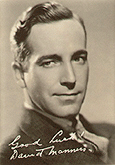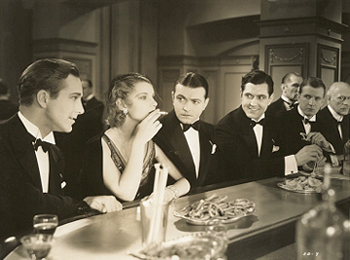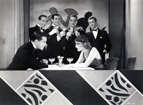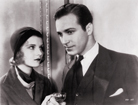|
The Last Flight, director William Dieterle's first American film, is an engrossing experience. Based on a story by John Monk Saunders (who also wrote "Wings") it paints the painful picture of four war-torn American flyers drinking their way through Europe after The Great War and their relationship with an equally lost woman. Reminiscent of Hemingway's "The Sun Also Rises," this "Lost Generation" story is, for the most part, a character study.
After the end of the Great War, flyers Cary Lockwood (Richard Barthelmess) and Shep Lambert (DM) are released by their doctor and advised to go back to America. Both suffering emotional as well as physical distress (Cary's hands are burned and Shep has a "tic" under his left eye) they decide instead to go to Paris. According to Shep, he plans on "getting tight and staying tight," now that the war is over. Joined by two other flyer buddies, Bill Talbot (Johnny Mack Brown) and Francis (Elliott Nugent) the four go off in pursuit of seeming pleasure. Under that desire for pleasure, however, is an obvious disillusionment with life and all things "of value." At a Paris nightspot they meet Nikki, (Helen Chandler) a rich, hard-drinking, waif whose incongruous babblings have as much to do with reality as their own lives. Joined by another unwelcome acquaintance, Frink, (Walter Byron) they float around Paris aimlessly. Frink's wandering hands target the pretty girl and here is where the plot develops. Tension mounts between the four pals and their unwanted guest as he is repeatedly warned to keep away from Nikki. Arriving in Portugal, Bill is mortally wounded when he jumps into the ring to prove that Americans can bullfight. Later, while handling guns at a target shoot, Frink, being confronted again by Cary, wounds Shep and is himself shot to death by Francis who disappears into the crowd. Leaving by cab, Shep reveals his wounds and dies in a moving scene. Left alone Cary and Nikki's relationship, always strained, now blossoms into romance.
The Last Flight expertly evokes the mood so prevalent after World War One. Although the plot is rather lacking in dramatic content, the performances of the cast create a lasting impression on the viewer. Mordaunt Hall of The New York Times reported, "Wild and irrational though it is, "The Last Flight," the talking picture now at the Warner's Strand, is in many respects a gifted production, the sum and substance of which frequently brings to mind Ernest Hemingway's novel, "The Sun Also Rises." Actually, it is an adaptation of John Monk Saunders' book, "A Single Lady," which as a magazine serial was known as "Nikki and Her War Birds." It is an interesting and occasionally brilliant attempt to reflect the post-war psychology of four wounded American aviators, but it is hardly convincing, particularly in the closing sequence. Nevertheless, because of Wilhelm Dieterle's clever direction and the fine performances of the players - particularly that of Helen Chandler, who impersonates a strange but fascinating young woman whose mentality and general recklessness have a great deal in common with the quartet of ex-air fighters - it is an intriguing shadow entertainment." He added, "Besides Miss Chandler's charming interpretation of Nikki there are compelling impersonations by Richard Barthelmess as Lockwood, by David Manners as Shep, by John Brown as Talbot, by Walter Byron as Frink, and by Elliott Nugent as Francis." The Last Flight is also one of the few films DM was actually proud of and was brought to the screen thanks to Richard Barthelmess who was "touched, amused, and moved" when he read the serial in Liberty magazine. Barthelmess purchased the screen rights and titled the film Silent Bullets. This was later changed to The Last Flight.
|



